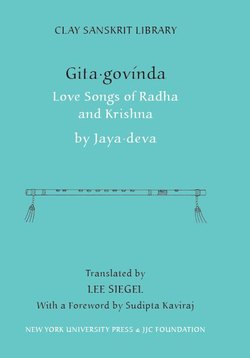Читать книгу Gita Govinda - Jayadeva - Страница 18
На сайте Литреса книга снята с продажи.
ОглавлениеINTRODUCTION
T
he “Gita·govinda: Love Songs of Radha and Krishna” (Gitagovindakavya), literally “a poetic composition about Govinda (Krishna the cowherd) with songs,” is a twelfth-century Sanskrit court poem, a sort of epyllion or little epic, comprised of twelve cantos within each of which there are one or more songs, twenty-four in all. This lyrical text was intended to be performed as a dramma per musica, its stanzas recited and its songs sung as a dancer danced, correlating physical gestures with verbal tropes, the terpsichorean ornaments of dance with those of poetry.
In the epigraphic opening stanza, the poet announces the subject of his composition—its hero, heroine, setting, tone, and theme: “Glory to the clandestine games of love of Radha and Krishna on the banks of the Yamuna.”
Jaya·deva then introduces himself to his audience, acknowledges the inspiration of the goddess of Language, and states that the “Gita·govinda” was composed for the delectation of rasikas, “people of taste” who delight in the erotic rasa, the poetic sentiment of sexual love and the physical arts and practices which are the substantive bases of that qualitative sentiment. The rasika was a connoisseur of the arts, a cultured aesthete who had cultivated the knowledge, sensitivities, and sensibilities required to savor that rasa. “May rasikas enjoy aesthetic bliss as they listen to my poetry” (6.9 [xii.8]). The poet repeatedly sings: “May rasikas be pleased by my sublime song” (9.9 [xvii.8]).
In the same introductory stanza, the poet proclaims that the “Gita·govinda” is meant particularly for the pleasure ________
